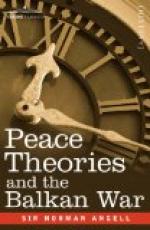Could we ask a better illustration than the history of the Turk and his Christian victims? I exemplified the matter thus: “If during long periods a nation gives itself up to war, trade languishes, the population loses the habit of steady industry, government and administration become corrupt, abuses escape punishment, and the real sources of a people’s strength and expansion dwindle. What has caused the relative failure and decline of Spanish, Portuguese, and French expansion in Asia and the New World, and the relative success of English expansion therein? Was it the mere hazards of war which gave to Great Britain the domination of India and half of the New World? That is surely a superficial reading of history. It was, rather, that the methods and processes of Spain, Portugal, and France were military, while those of the Anglo-Saxon world were commercial and peaceful. Is it not a commonplace that in India, quite as much as in the New World, the trader and the settler drove out the soldier and the conqueror? The difference between the two methods was that one was a process of conquest, and the other of colonizing, or non-military administration for commercial purposes. The one embodied the sordid Cobdenite idea, which so excites the scorn of the militarists, and the other the lofty military ideal. The one was parasitism; the other co-operation....
“How may we sum up the whole case, keeping in mind every empire that ever existed—the Assyrian, the Babylonian, the Mede and Persian, the Macedonian, the Roman, the Frank, the Saxon, the Spanish, the Portuguese, the Bourbon, the Napoleonic? In all and every one of them we may see the same process, which is this: If it remains military it decays; if it prospers and takes its share of the work of the world it ceases to be military. There is no other reading of history.”
But despite these very plain lessons, there are many amongst us who regard physical conflict as the ideal form of human relationship; “killing and being killed” as the best way to determine the settlement of differences, and a society which drifts from these ideals as on the high road to degeneration, and who deem those who set before themselves the ideal of abolishing or attenuating poverty for the mass of men, “low and sordid.”
Thus Mr. Cecil Chesterton[5]:
In essence Mr. Angell’s query is: “Should usurers go to war?”




